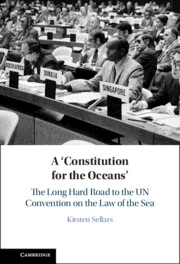Book contents
- A ‘Constitution for the Oceans’
- A ‘Constitution for the Oceans’
- Copyright page
- Contents
- Foreword
- Abbreviations
- 1 End of the Old Order
- 2 Old Freedoms, New Rights
- 3 North, South, East and West
- 4 A Conference Collapses
- 5 Internationalising the Seabed
- 6 Passage through Straits
- 7 The Archipelagic Concept
- 8 New International Orders
- 9 The Bitter End
- Afterword
- Bibliography
- Index
5 - Internationalising the Seabed
Common Heritage and the UN Seabed Committee
Published online by Cambridge University Press: 06 February 2025
- A ‘Constitution for the Oceans’
- A ‘Constitution for the Oceans’
- Copyright page
- Contents
- Foreword
- Abbreviations
- 1 End of the Old Order
- 2 Old Freedoms, New Rights
- 3 North, South, East and West
- 4 A Conference Collapses
- 5 Internationalising the Seabed
- 6 Passage through Straits
- 7 The Archipelagic Concept
- 8 New International Orders
- 9 The Bitter End
- Afterword
- Bibliography
- Index
Summary
In 1967, Malta’s UN ambassador Arvid Pardo put forward a proposal to internationalise the deep seabed to preserve it for exclusively peaceful purposes and to exploit it for the benefit of all, especially the most impoverished states. This attempt to inhibit the coastal states’ expanding claims did not win unqualified support, as became apparent during the ensuing UN seabed committee discussions. Some Latin American states feared the roll-back of their existing claims, and some land-based mineral producers feared competition from seabed operations. Meanwhile, the maritime powers, while seeing the commercial and naval advantages of an internationalised seabed regime, were nonetheless determined to sideline peaceful purposes and narrow the range of resources deemed to be of common heritage. This was reflected in the ambiguities and omissions in the General Assembly’s Declaration of Principles resolution, which declined to decide the line between the continental shelf and the international seabed, or define the central concepts of ‘common heritage’ and ‘peaceful purposes’.
Keywords
- Type
- Chapter
- Information
- A ‘Constitution for the Oceans' , pp. 137 - 163Publisher: Cambridge University PressPrint publication year: 2025

